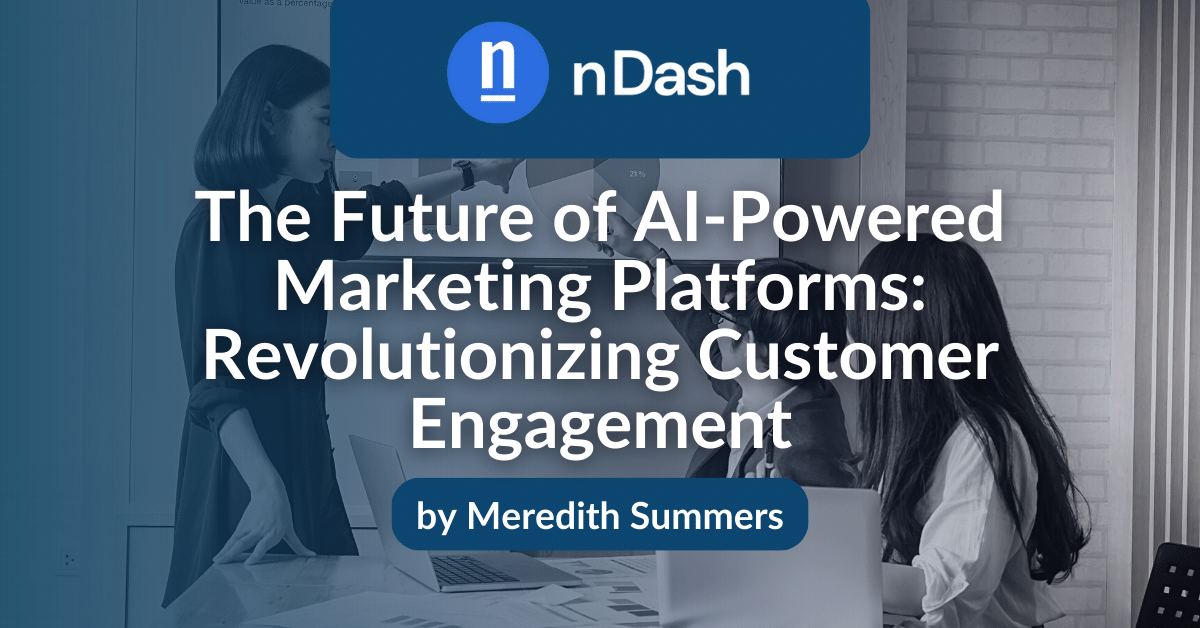AI-powered marketing platforms can reshape customer engagement and drive business growth by transforming interactions. See how the latest platforms help companies forge stronger bonds with hyper-personalized messaging.
The Emergence of AI in Marketing Platforms
The first marketing platforms in the 1990s were little more than basic content management systems. They could help marketers manage basic web pages and subsidiary sites. As the years rolled by, capabilities expanded to social media posts, email, analytics, etc. Marketers began integrating their campaigns to create more cohesive brand messaging.
Today, marketing platforms are transforming with the emergence of AI. This technology has shown tremendous promise in aligning marketing efforts with the company’s larger revenue goals. Artificial intelligence tools of today can answer customer questions, predict a customer’s needs, and design content that converts.
All AI tools rely on making the most of the data and patterns, determining the bottom line. However, they function differently depending on the sector and its target demographic. AI can assist if you want to sign people up to volunteer, purchase a product, or commit to a year-long subscription. It can send the right content at the right time to the right person. Of course, it will take a little finesse to make the most of these tools (particularly when competitors can access the same technology).
Personalized Marketing: A New Frontier
AI enables hyper-personalized marketing with algorithms that analyze your most important metrics and parameters. Brands defined by strong social values often face the challenge of crafting consistent messaging across various platforms. Language models built into marketing platforms can assist in generating accurate and consistent messaging that aligns with these values. Moreover, it can tailor the content to each customer without losing the company’s unique voice.
AI compiles data and attempts to extract the most relevant insights from it. Marketers aiming to connect with customers can expect modern marketing platforms to drill deeper into core motivations.
Take a popular toy store that caters to different demographics. A harassed parent searching for an action figure for their child will have a different approach than a hard-core collector who needs it as the final touch for their display case. It’s the same product, but a personalized marketing message changes the dynamics. The insights derived from AI can be the solution to winning both types of business.
Marketers embracing this new frontier (while still acknowledging AI’s limits) will likely have stronger results from each campaign. They’re more likely to gain and retain customer loyalty by keeping them engaged.
Predictive Analytics in Marketing: Anticipating Customer Needs
Predictive analytics relies on data from different sources, including email, purchase history, and demographics. Once collected, it’s scrubbed, cataloged, and delivered into a more comprehensive format. AI networks can parse the data and infer conclusions that tell marketers what a customer will likely need next.
In the past, many of the earlier expectations of AI fell short of the reality of the technology. Today, tools like AI-powered Customer Data Platforms (CDP) create a larger central intelligence to govern rules over vast data collections. nDash launched AI content ideas to help marketers tailor their subject matter to meet the needs of their audience.
That leads to better segmentation and resource allocation. Predictive analytics enable marketers to identify which customers drive their revenue. This knowledge is crucial for reaching these customers effectively, especially amidst rising competition. AI platforms aim to provide users with actionable insights. They do more than just highlight the most profitable products or identify customers likely to spend the most.
Anticipating customer needs helps reduce churn because you can reach them before they can look elsewhere. For marketers with limited budgets, predictive analytics can also help reduce the back-and-forth in planning your monthly spend.
Automated Campaign Management: Efficiency and Effectiveness
Automation has been a game-changer for companies that want to reduce wasted time on repetition. These processes, including anything from email blasts to Facebook posts, are reaching the next level thanks to AI. In some industries (e.g., insurance, etc.), intelligent automation is often considered more effective than transitioning to pure artificial intelligence. That’s because some professionals remain skeptical about privacy concerns and AI’s ability to draw the correct conclusions.
AI-powered automation can now flag tasks that need human attention, taking the guesswork out of what to automate. These added insights give marketers the confidence to delegate more tasks to automation, freeing them up for strategic work. The more automation marketers can introduce, the tighter their strategies will become. Prioritize automating repetitive tasks that drain your staff’s energy – this avoids wasting resources. By reducing resource waste, you’ll naturally see a more impressive return on investment (ROI) for your marketing budget.
Challenges and Considerations in AI-Powered Marketing
AI-powered marketing platforms may be impressive, but they’re not a panacea. Because humans built them, there’s a very real potential that they fall into the same traps as many humans do. There’s concern over AI’s potential to replace marketing positions. Additionally, the conclusions and biases of AI-powered marketing may lead to the exclusion of certain groups while favoring others.
Addressing these concerns involves creating a balance between automation and the more nuanced neural networks of professional marketers. Keeping up with rapidly evolving AI platforms doesn’t just mean tracking the introduction and features of each product. It means consistently evaluating how the results meet the company’s standards. An AI network discriminating against a large part of your demographic can undermine the company’s foundational values.
Measuring Success: AI-Driven Analytics and ROI
Measuring success starts with defining your metrics, including conversions, customer satisfaction, or brand awareness. Marketers gain new insights after introducing an AI-powered marketing platform to the organization. They can track how AI tools affect click-through rates, lead quality, and the number of social media interactions.
Tracking can all be done through the right software solution, either a CRM, CDP, or other media platform. The best solutions use a suite of AI-powered tools to capture and aggregate customer interactions. That includes structured and unstructured data to see which engagement tactics have the most impact.
AI relies on continually learning from the given data and the people that dictate it. As times and preferences change, it should continuously adapt. However, this doesn’t discount a marketer’s need to do the same. AI can quickly cause companies to lose their unique flavor and market presence.
The Integration of AI in Marketing Platforms
AI integration for every company is still at a formative level. However, complex initiatives are already underway to smooth the tech-laden road ahead. Overall, the potential of AI integration for marketing truly knows no bounds. We’re at a precipice where we can use it to solve complex problems and speak to customers individually. It can also improve the efficacy of nearly every effort.
As we look ahead, it will be up to the individual organizations to use AI to shuffle their resources where they will have the best ROI. That’s why nDash introduced an AI ideation tool to empower rather than replace people.
Marketing Platforms in 2024 and Beyond
Today’s platforms go several steps above and beyond for the customer. Embrace AI-powered marketing platforms to revolutionize your engagement and drive business success.
About the Author
 Meredith Summers is a freelancer who covers real estate, healthcare, insurance, marketing, and tech security. Hyperaware of SEO, brand, and voice. Dedicated to giving real advice to real people without the fluff. Check out her profile to learn more about how her work can support your content strategy: Meredith Summers.
Meredith Summers is a freelancer who covers real estate, healthcare, insurance, marketing, and tech security. Hyperaware of SEO, brand, and voice. Dedicated to giving real advice to real people without the fluff. Check out her profile to learn more about how her work can support your content strategy: Meredith Summers.
